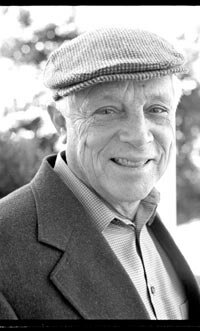Publicity bunt: Collins first arrestee in House race
A politician on his soapbox in the town square– it's a Norman Rockwell image that evokes an era when Americans did their nuts-and-bolts business on Main Street.
What happens to political free speech when the town square is private property?
Rich Collins found out May 7. The retired UVA prof and 57th District General Assembly candidate was politickin' in the Shopper's World parking lot on U.S. 29 north. When he was asked to leave because the shopping center is private property, Collins refused. The 70-year-old was arrested, charged with trespassing– and now could be party to a potentially precedent-setting Virginia case.
Some states, like California and New Jersey, protect political speech in privately owned public places. "This is an area the Supreme Court left entirely to states," says Bob O'Neil, director of the Thomas Jefferson Center for the Protection of Free Expression.
He thinks Virginia's law leans more toward private property protection, but there's so little case law, it could be time to revisit the issue. "This may be a tabula rasa," says O'Neil, who believes there should be a difference between the privacy rights inside a store and outside.
"Not all private property is private for all purposes," says O'Neil, noting that shopping centers are for most purposes open to the public. "Nor is all public property open for public expression– try a hospital waiting room."
Collins had been campaigning door-to-door and wanted to reach more people, such as the Whole Foods demographic. "I wanted people likely to vote for me, more conscious of health and environmental issues," he says.
The environmental negotiator soon found himself in a position he couldn't negotiate his way out of. Chuck Lebo, president of the company that manages Shopper's World and five other shopping centers, told him he had to leave– and then called the police.
Lebo Commercial Property forbids solicitations. "We absolutely allow none, including the Boy Scouts," says LeBo. "My number one issue is safety," and the liability potential.
Three police cars showed up for the hour-long stand-off, according to Collins.
"I had no idea this was illegal," says Collins. "I felt singled out and bullied under a set of rules that could hardly be defended."
"Mr. Collins repeatedly stated he wanted to be arrested," says LeBo, "because his campaign didn't have much funding and this was a good way to get free publicity."
Collins says, however, that as a negotiating tool, he told Lebo that his arrest would garner lots of publicity, and he asked Lebo if he wanted that sort of negative publicity.
Was the arrest a publicity stunt? "Absolutely not," declares Collins. "If I was trying to do it for publicity, would I be so dumb to have no one with a camera there?"
"We asked him at least a dozen times to leave, and he cursed at least once," says Lebo.
"I probably used one word– I don't remember the word," admits Collins. "I was a little combative."
The greater issue to Collins: "Declining public spaces as privatization takes place is an issue that's troubled me... As a planner, these are places where people meet. How do we plan for that?"
In Charlottesville, Shopper's World isn't the only shopping center that bans political speech. Fashion Square Mall does, too, as does Barracks Road Shopping Center, which booted the annual Buy Nothing Day demonstration from its property in 2000.
Collins contacted the American Civil Liberties Union to help fight his trespassing charges, which have been postponed until a July 5 hearing.
"We're obviously interested in the case," says Kent Willis, head of ACLU of Virginia. A research committee will make an initial decision, and the case would have to be approved by the ACLU board when it meets May 21.
In Robins v. Pruneyard, the Supreme Court decided that political speech protected by the first amendment applies only to public property, explains Willis– but states are free to write their own laws to extend that protection to shopping malls, which California had done.
"We'd ask the Virginia Supreme Court to interpret free speech rights on private property," says Willis. "If town centers have disappeared and are replaced with shopping centers and malls, we're looking to extend those rights to shopping centers and malls."
That would be an "enlightened" reading of the state constitution, according to constitutional expert A.E. "Dick" Howard. As much as he sympathizes with Collins, Howard thinks it's unlikely Collins will prevail in the Commonwealth. "Given the conservative bent of the Virginia Supreme Court, I'd be surprised if they read the constitution as broadly as California and New Jersey."
"When I get to Richmond," says the ever-feisty Collins, "you can be sure I'm going to look at these laws."
His opponents in the June 14 Democratic primary haven't rushed to defend a politician's right to campaign in mall parking lots.
Kim Tingley calls the issue "clear as mud," and as a small business owner, sympathizes with a shop owner who might be subjected to an anti-abortion protester with hideous graphics in front of his store. He sees the challenge– if the General Assembly were to craft legislation– to balance both First Amendment and private property rights.
David Toscano, widely considered the front-runner for the Democratic party nomination– did not return phone calls requesting comment by press time.
Collins is sure his arrest is going to affect his campaign, but not how. "I'm not sure it's a plus or a minus," he says. Several supporters have applauded him for bringing the issue of free speech in privately owned public places to the forefront.
Lebo stands squarely on the side of private property rights. "We want our customers to feel comfortable shopping and not be harassed by anyone," he says.

Rich Collins fears his arrest for trespassing will distract from more important campaign issues, such as his no-growth tax and revision of the Dillon Rule to expand the powers of local government.
PHOTOS BY JEN FARIELLO